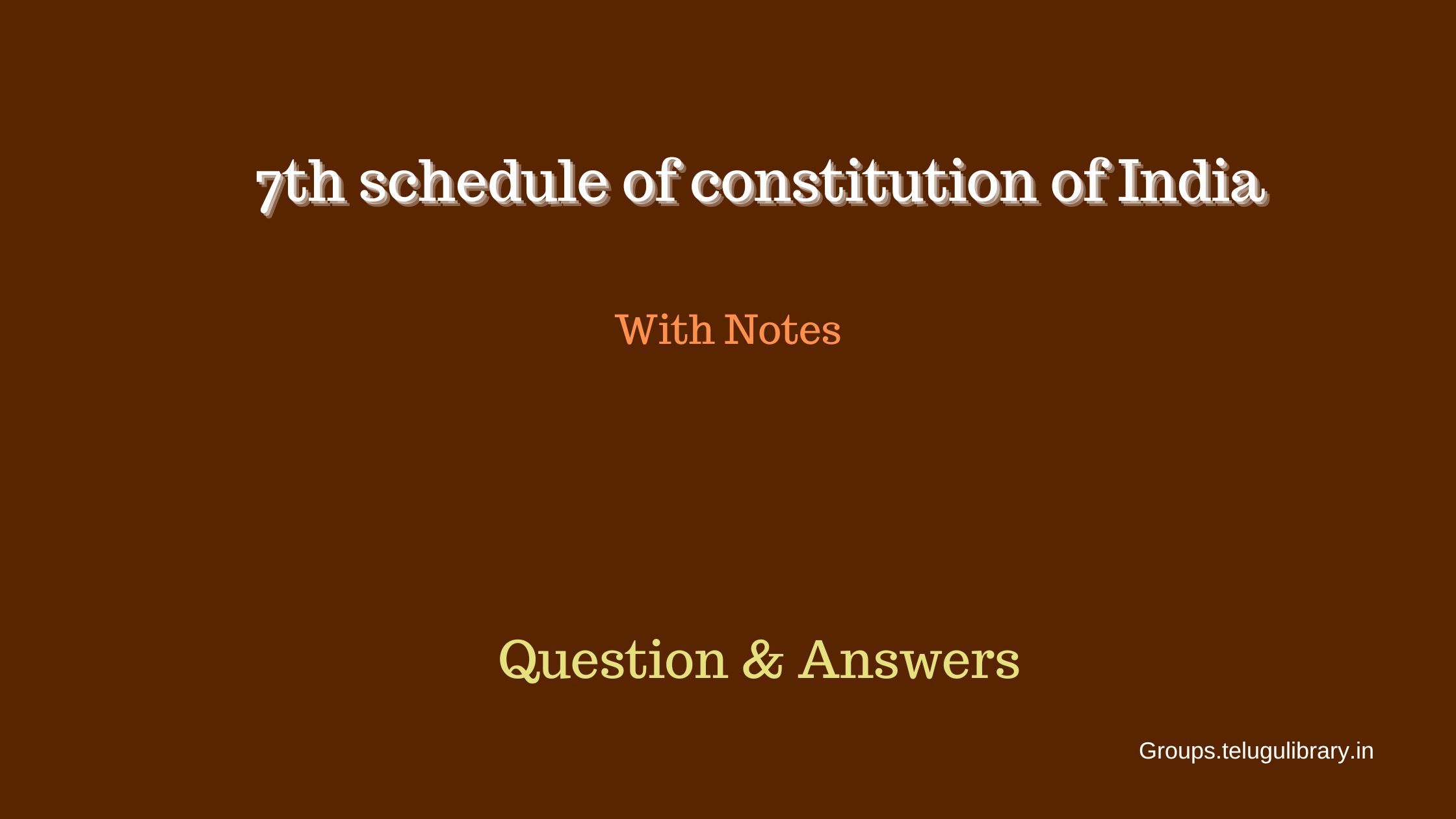7th schedule of Constitution of India…
Seventh Schedule of the Indian Constitution
The Seventh Schedule of the Constitution of India deals with the distribution of powers and responsibilities between the Union (central) government and the State governments. It divides the legislative powers into three lists: the Union List, the State List, and the Concurrent List.
1. Union List (List I):
The Union List contains subjects on which only the Union government has the exclusive power to make laws.
It includes matters of national importance and interest. There are 100 items in this list.
Examples of subjects in the Union List include defense, foreign affairs, atomic energy, currency, and railways.
2. State List (List II):
The State List comprises subjects on which only the State governments have the exclusive power to make laws.
These subjects typically pertain to local and regional matters within each state. There are 61 items in this list.
Examples of subjects in the State List include police, public health, agriculture, irrigation, and land rights.
3. Concurrent List (List III):
The Concurrent List includes subjects on which both the Union and State governments can make laws, but in case of a conflict between Union and State laws on concurrent subjects, Union laws prevail.
There are 52 items in the Concurrent List.
Examples of subjects in the Concurrent List include criminal law, marriage, education, adoption, bankruptcy, and electricity.
The division of powers and responsibilities as outlined in the Seventh Schedule is crucial for maintaining the federal structure of India. It ensures a balance of authority, allowing both the central government and State governments to function independently within their respective areas of jurisdiction while addressing matters of national importance and inter-state cooperation.
In case of disputes over legislative powers, the Constitution provides mechanisms for resolution, including the Inter-State Council, to promote coordination and cooperation between the Union and the States.
Understanding the Seventh Schedule is important for exams as it forms the foundation of India’s federal structure, which is a key feature of the Indian Constitution. It defines the limits of authority for both the Union and State governments, making it a fundamental aspect of the Indian constitutional framework.
7th schedule of constitution of India with Question and Answers:
Question 1: What is the primary purpose of the Seventh Schedule of the Indian Constitution?
Answer: The primary purpose of the Seventh Schedule is to distribute powers and responsibilities between the Union (central) government and State governments in India.
Question 2: How many lists are there in the Seventh Schedule, and what are they called?
Answer: There are three lists in the Seventh Schedule: the Union List (List I), the State List (List II), and the Concurrent List (List III).
Question 3: Which list in the Seventh Schedule contains subjects related to matters of national importance and is exclusively under the jurisdiction of the Union government?
Answer: The Union List (List I) contains subjects related to matters of national importance and is exclusively under the jurisdiction of the Union government.
Question 4: Give an example of a subject found in the State List (List II) of the Seventh Schedule.
Answer: An example of a subject in the State List is “police.”
7th schedule of constitution of India…
Question 5: How many items are there in the Concurrent List (List III) of the Seventh Schedule?
Answer: There are 52 items in the Concurrent List (List III).
Question 6: What happens in case of a conflict between Union and State laws on subjects listed in the Concurrent List?
Answer: In case of a conflict, Union laws prevail over State laws.
Question 7: How is the Seventh Schedule important for the federal structure of India?
Answer: The Seventh Schedule is crucial for maintaining India’s federal structure as it defines the distribution of powers and responsibilities between the central government and State governments, ensuring a balance of authority and cooperation on matters of national and regional significance.
Question 8: In the context of the Seventh Schedule, what is the Inter-State Council used for?
Answer: The Inter-State Council is used for resolving disputes and promoting coordination and cooperation between the Union and the States regarding legislative powers and other matters.
Question 9: What is the total number of items in the Union List (List I) of the Seventh Schedule?
Answer: The Union List contains a total of 100 items.
7th schedule of constitution of India…
Question 10: Can State governments make laws on subjects in the Union List (List I)?
Answer: No, State governments do not have the authority to make laws on subjects listed in the Union List;
it is under the exclusive jurisdiction of the Union government.
Indian constitution New challenges Notes With Questions and Answers
“Distinctive Features of Indian Federalism: Student-Friendly Question & Answers”
What are Fundamental Duties class 9-Question and Answers
What do you mean by Directive Principles of State Policy?
Understanding Fundamental Rights in the Indian Constitution – Exam Study Material
“Tribute to Sarvepalli Radhakrishnan: The Philosopher-President Who Shaped India’s Future”
What is India’s uniform civil code? History of Uniform Civil Code India and Questionnaire
